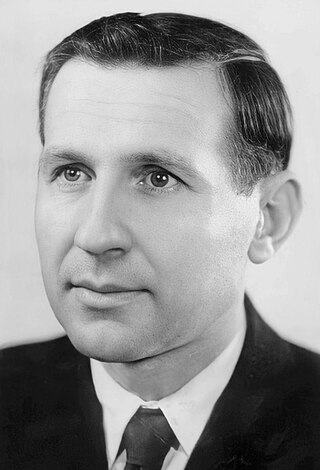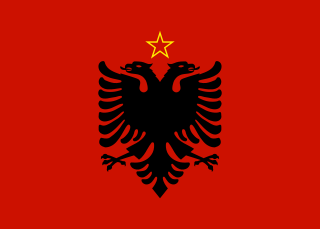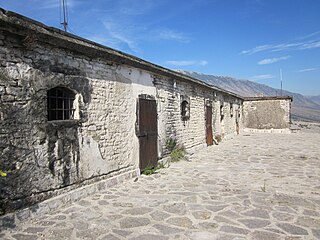
The Directorate of State Security, commonly called the Sigurimi, was the state security, intelligence and secret police service of the People's Socialist Republic of Albania. Its proclaimed goal was maintaining state security of Albania, but de facto the Sigurimi served to suppress political activity among the populace and preserve the existing political system. It is regarded as one of the most feared and repressive agencies to ever exist.

Mehmet Ismail Shehu was an Albanian communist politician who served as the Prime Minister of the People's Socialist Republic of Albania from 1954 to 1981. He was known as a close confidant of Enver Hoxha and served in various high-ranking positions in the government.

Burrel is a town in northern Albania, 91 km from Tirana. At the 2015 local government reform it became a subdivision and the seat of the municipality Mat. It was the seat of the former District of Mat. The population as of the 2023 census is 7,928.

Adil Çarçani was an Albanian politician who served as the 24th Prime Minister of Albania during the Communist era led by Enver Hoxha. He served as the titular head of the Albanian government in the years immediately preceding the fall of Communism.

Haxhi Lleshi was an Albanian military leader and communist politician who served as the Chairman of the Presidium of the People's Assembly of the People's Socialist Republic of Albania from 1953 to 1982.

The People's Socialist Republic of Albania, officially as the People's Republic of Albania from 1946 until 1976, and as the Republic of Albania from 1991 to 1992, was the communist state in Albania from 1946 to 1991. It succeeded the Democratic Government of Albania (1944–1946).

Pjetër Filip Arbnori was an Albanian politician and dissident of the communist regime in Albania. He was dubbed "the Mandela of the Balkans" by Albanian statesmen because of the length of his 28-year internment. He was born in Durrës, on the Adriatic coast. President Topi bestowed the Nation's Honor Order upon Pjetër Arbnori.

Bashkim Shehu is an Albanian writer who lives in Barcelona, Spain.

Beqir Balluku was an Albanian politician, military leader, and Minister of Defense of Albania. Balluku assisted Enver Hoxha in carrying out the 1956 purge within the Party of Labour. However, in 1974, Balluku himself, along with a group of other government members was accused by Hoxha of an attempted coup d'état against the Albanian People's Republic. He was executed the next year.
The People's Republic of Albania executed 22 intellectuals without trial on 26 February 1951, as ordered by Enver Hoxha. They were accused of bombing the Soviet embassy in Tirana. The victims were 21 men and 1 woman. One day earlier, Jonuz Kaceli was killed while accused of the same crime. It was the first time the Agitation and Propaganda law was used.

The Spaç Prison was a political prison in Communist Albania at the village of Spaç. The former prison is listed as a second-category national monument. There were plans to turn the rapidly deteriorating site into a museum, but as of February 2013, no progress had been made at the location. In 1973, a number of prisoners staged a rebellion where the non-communist flag was raised. In 1984, a similar rebellion took place at the prison of Qafë Bar.

Sabiha Kasimati was an Albanian professor of biology and ichthyologist, cited as one of the first women scientists in Albania. She was arrested by the communist regime on 20 February 1951, after the bombing of the Soviet embassy, and a few days later was executed without trial along with 21 other intellectuals.
The Prison Hospital of Tirana is a prison in Tirana, Albania. It was established in 1930. It was closed under the Communist regime, but was reopened in 1998.

Prisons in Albania are divided into three levels: closed, semi-open, and open. A difference is made between ordinary closed prisons and high security prisons. Most Albanian prisons have separate blocks (wings) for women and children (juveniles), while others keep women and children together.

Dom Simon Jubani was a Catholic priest and Albanian political prisoner confined in Burrel Prison for 26 years during the regime of Enver Hoxha.

Kadri Hazbiu was an Albanian politician of the Albanian Party of Labour (PPSh).
Ramadan Çitaku (1914-1990) was an Albanian politician of the Party of Labour of Albania. A native of Kosovo, he was one of the founding members of the Albanian Communist Party, member of the General Council of the National Liberation Movement during World War II, Minister of Finance of Albania, and diplomat.

Pirro Kondi was an Albanian politician of the Party of Labour of Albania (PPSh). Coming from a family with strong communist background, he became member of the Albanian Parliament and a candidate-member of the Politburo of the Party of Labour of Albania by the '80.

Alfons Tracki was an Albanian Catholic priest of German origin, who died as a martyr as a result of the religious persecution by the regime of Enver Hoxha in communist Albania.

The General Directorate of Prisons (DPB) (Albanian: Drejtoria e Përgjithshme e Burgjeve) is an institution in Albania under the umbrella of the Ministry of Justice. The main task of the directorate is the management of criminal institutions, as well as the creation of appropriate conditions for rigorous enforcement of all obligations arising from the existing legal framework, transforming the criminal sentences into re-education options.

















